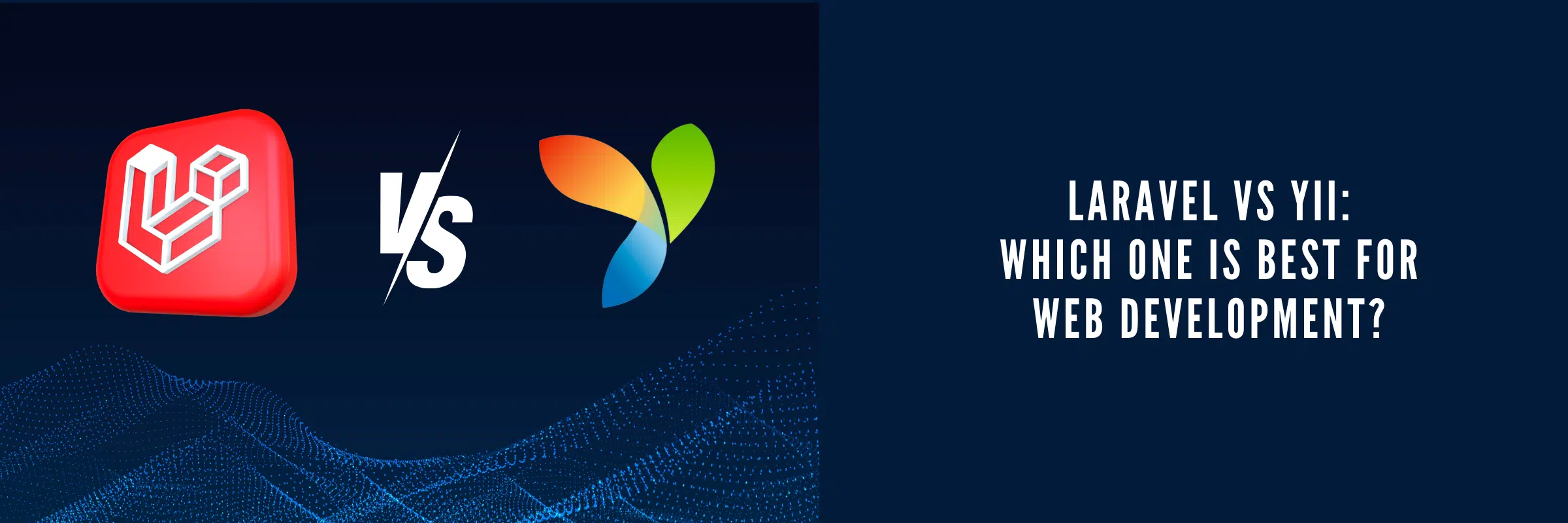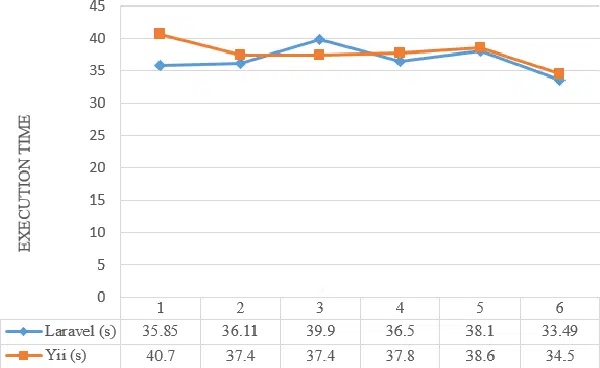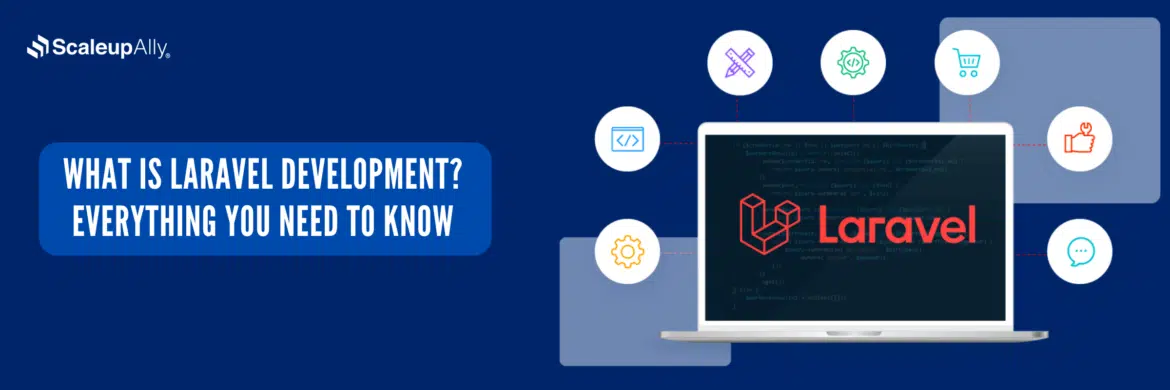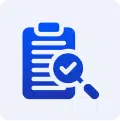
Laravel vs Yii: Which One is Best for Web Development?
Suprabhat Sen | December 1, 2023 , 9 min read
Table Of Content
In the realm of PHP frameworks, Laravel and Yii stand out as popular choices for crafting robust web applications. Both adhere to the Model-View-Controller (MVC) architectural pattern, offering a plethora of features and tools to streamline the development process.
However, determining the better fit between Laravel and Yii requires a comprehensive comparison based on performance, security, technology integration, development costs, and more.
In this article we will explore some of the key differences between Laravel and Yii and will give you a detailed breakdown of when you should use these technologies.
What is Laravel?
- What is Laravel?
- What is Yii?
- Key differences between Laravel and Yii
- Head-to-Head Comparison Between Laravel & Yii
- When Choosing Yii is Profitable for Your Business?
- When Choosing Laravel is Reasonable for Your Product?
- EPAM Startups & SMBs Experience in Using Laravel and Yii
- Conclusion
- Frequently Asked Questions
At its core, Laravel stands tall as an open-source PHP framework revered for its prowess in simplifying the intricate landscape of web application development. Embracing the time-tested Model-View-Controller (MVC) architecture, Laravel elegantly compartmentalizes the different facets of an application—be it the business logic, user interface, or data management.
This architectural approach bestows Laravel the virtues of heightened maintainability and testability, making the development journey smoother and more efficient.
Key Features of Laravel:
- MVC Architecture: Segregates components for organized and efficient development.
- Expressive Syntax: Empowers developers to craft clean, readable code with ease.
- Eloquent ORM: An indispensable tool within Laravel, it acts as a bridge to effortlessly navigate and manipulate databases, offering a fluid and intuitive interface for database operations.
- Rich Library Ecosystem: Boasting a treasure trove of libraries and packages, Laravel accelerates development by providing a wide array of pre-built solutions and components.
Also Read: Benefits of using Laravel Framework
What is Yii?
Yii isn’t just another PHP framework; it’s a powerhouse renowned for its exceptional performance and efficiency in crafting web applications. Embracing the Model-View-Controller (MVC) pattern, Yii boasts a robust arsenal of features meticulously designed to cater to the needs of web application development.
Its intuitive and developer-friendly design has endeared Yii to many in the development community.
Key Features of Yii:
- Performance Excellence: Yii’s standout trait lies in its exceptional performance metrics, owing to a series of optimization techniques meticulously woven into its framework. These techniques include:
- Lazy Loading: Strategically deferring the loading of resources until the point they’re needed, optimizing resource utilization.
- Caching Mechanisms: Leveraging caching at various levels to enhance response times and minimize redundant operations.
- Query Optimization: Implementing optimized query execution strategies for efficient database operations.
- Gii: The Code Generator: Yii’s ace up its sleeve is Gii—an ingenious code generation tool. Gii simplifies and expedites the development process by swiftly generating essential components such as models, controllers, and views. This functionality dramatically accelerates the initial setup phase of a project, granting developers more time to focus on refining functionalities rather than starting from scratch.
Key differences between Laravel and Yii
| Feature | Laravel | Yii |
| Performance | Slower compared to Yii | Faster compared to Laravel |
| Security | Comprehensive security features | Built-in role-based access control |
| Technology Integration | Seamless integration with popular front-end frameworks | Integration with various technologies and extensions |
| Development Costs | Extensive documentation and large community | Code generation tool for faster development |
| Community Support | Large and active community | Active community with extensive resources |
Head-to-Head Comparison Between Laravel & Yii
1. Performance

- Laravel: While not as swift as Yii, it offers features like class-map optimization, routing enhancements, and the Blade templating engine. These contribute significantly to overall application performance by streamlining processes and enabling efficient code authoring.
- Yii: Known for its exceptional execution speed and resource efficiency owing to optimization techniques like lazy loading, caching, and query optimization. Ideal for high-traffic and real-time data processing applications.
2. Security
Security is a critical aspect of web application development. Both Laravel and Yii prioritize security and provide features and mechanisms to protect applications from common security threats.
- Laravel: Offers a comprehensive set of security features, including protection against XSS, CSRF, and SQL injection attacks. Boasts a secure authentication system with features like password hashing, encryption, and two-factor authentication. Designed to be user-friendly and easily configurable, making it an attractive choice for security-focused developers.
- Yii: Provides built-in support for RBAC, enabling fine-grained access control. Additionally, it includes features for input validation, output filtering, CSRF attack prevention, and secure cryptographic functions for data encryption and hashing, ensuring robust security measures.
3. Emergent Technologies Integration
Both Laravel and Yii support the integration of emergent technologies and third-party libraries. This flexibility allows developers to leverage the latest tools and technologies to enhance their applications.
- Laravel: Flourishes within a vibrant ecosystem offering a wide array of packages via Composer. Seamlessly integrates with libraries like PHPUnit for testing, Guzzle for HTTP requests, and Laravel Passport for API authentication. Compatible with popular front-end frameworks like Vue.js and React, facilitating modern and interactive UI development.
- Yii: Supports integration with emerging technologies through its built-in extension repository, Yii Extension. Compatible with front-end frameworks such as Angular and React. Additionally, integrates smoothly with technologies like Docker and Elasticsearch, making it versatile for diverse web development needs.
4. Development Costs
When it comes to development costs, both Laravel and Yii offer cost-effective solutions for web application development.
- Laravel: Benefits from extensive documentation, a large community, and pre-built packages, reducing development time and costs. Its expressive syntax and organized structure contribute to code maintainability, allowing for efficient updates. Built-in testing tools ensure application stability, further reducing overall development costs.
- Yii: Offers cost-effective development with its user-friendly interface and Gii code generation tool, accelerating code creation and reducing development time. Performance optimizations and caching mechanisms minimize server resource usage, contributing to cost savings. Active community and comprehensive documentation provide abundant resources and support for developers, further reducing costs.
5. Community Support
Community support is an essential factor to consider when choosing a PHP framework. Both Laravel and Yii have active and supportive communities that provide resources, tutorials, and help for developers.
- Laravel: Enjoys a vibrant and expansive community, housed in platforms like Laravel.io, offering documentation, tutorials, and forums for issue resolution. Actively contributes to the framework’s growth, providing a rich repository of packages and libraries via Composer.
- Yii: Boasts a robust community on its official website, delivering documentation, tutorials, and a dedicated forum for developer queries. Regularly updates and extends functionalities, ensuring developers have access to the latest tools and technologies.
When Choosing Yii is Profitable for Your Business?
Yii emerges as a profitable choice for businesses across various scenarios, offering distinct advantages:
- High-Traffic Web Applications: Yii’s exceptional performance optimizations cater perfectly to high-traffic web applications demanding rapid response times and efficient resource utilization. Its streamlined execution significantly curtails server costs by minimizing resource usage, making it a cost-effective choice.
- Complex Web Applications: Businesses seeking to build intricate web applications with advanced features find Yii’s support for role-based access control (RBAC) invaluable. This capability allows for the implementation of meticulous access controls, fortifying application security. Additionally, Yii’s code generation tool, Gii, plays a pivotal role in reducing development time and costs, ideal for projects with stringent deadlines and budget constraints.
When Choosing Laravel is Reasonable for Your Product?
Laravel is a go to choice for businesses across diverse scenarios, offering a multitude of advantages:
- Code Maintainability and Readability: Businesses valuing clean, readable code find Laravel’s expressive syntax and elegant code structure highly appealing. This emphasis on maintainability ensures codebases remain comprehensible and easily manageable.
- Seamless Integration and Scalability: Laravel’s extensive documentation and large community make it a reasonable choice for businesses requiring smooth integration with popular front-end frameworks like Vue.js or React. Its compatibility fosters scalable and secure web applications with a robust API layer, enabling businesses to expand their offerings effectively.
- Testing and Quality Assurance: Businesses emphasizing comprehensive testing and quality assurance benefit from Laravel’s built-in testing tools and testing-friendly architecture. These tools minimize the risk of bugs and issues in production, ensuring application stability and reliability.
EPAM Startups & SMBs Experience in Using Laravel and Yii
Drawing from extensive experience with both Laravel and Yii, the team at EPAM Startups & SMBs has successfully delivered numerous web development projects utilizing these frameworks. The insights gleaned from these experiences highlight the distinct strengths of each:
- Laravel: Ideal for businesses prioritizing code maintainability, scalability, and robustness. Its expressive syntax and strong community support enable the creation of clean, readable codebases, fostering maintainability and scalability.
- Yii: Highly suitable for businesses requiring high-performance web applications. Yii’s optimization techniques, resource efficiency, and simplicity make it a cost-effective option for projects with stringent budget and time constraints.
Conclusion
Choosing the ideal PHP framework is pivotal for your project’s success. Laravel and Yii both shine in distinct ways.
Laravel emphasizes code integrity, readability, and scalability with expressive syntax and seamless integration with prevalent front-end frameworks. Its extensive documentation and vast community cater to businesses of all sizes.
In contrast, Yii stands out for its performance prowess and efficiency. The framework’s optimizations, resource management, and Gii code generation tool make it an enticing choice for cost-effective web development.
The decision between Laravel and Yii hinges on project requirements, budget, and objectives. By considering factors like performance, security, community support, and development costs, you’ll empower your project with the right framework for building robust, scalable, and secure web applications.
Frequently Asked Questions
Q: Is Laravel better than Yii?
The choice between Laravel and Yii depends on your specific project requirements and business goals. Laravel excels in code maintainability, readability, and its vibrant community, while Yii focuses on performance and efficiency. Consider factors such as performance, security, development costs, and community support to make an informed decision.
Q: Is Yii similar to Laravel?
Yii and Laravel are both PHP frameworks that follow the MVC architectural pattern. They have similarities in terms of their structure and approach to web development. However, there are significant differences in terms of performance, features, and community support. It is important to evaluate these differences and choose the framework that best suits your project requirements.
Q: Where can I find documentation and resources for Laravel and Yii?
Laravel and Yii both have official documentation websites where you can find comprehensive guides, tutorials, and API references. For Laravel, visit laravel.com/docs. For Yii, visit yii-framework.com/doc. Additionally, both frameworks have active communities with forums and online resources where you can seek help and connect with other developers.
Related Blogs

Mobile-First Design: The Complete Guide
Learn how to implement mobile-first design, a user-centered approach that optimizes websites for mobile devices.
ScaleupAlly Team
Jan 9 ,
11 min read

What is Laravel Development? Everything You Need To Know
Laravel simplifies web development with robust features like MVC architecture, real-time support, and enhanced security.
ScaleupAlly Team
Jan 7 ,
9 min read

Low Code Development: Is It The Future of Development?
Is low-code the future of software development? Learn how this technology is transforming the way applications are built, enabling rapid business innovation.
Suprabhat Sen
Jan 2 ,
14 min read








